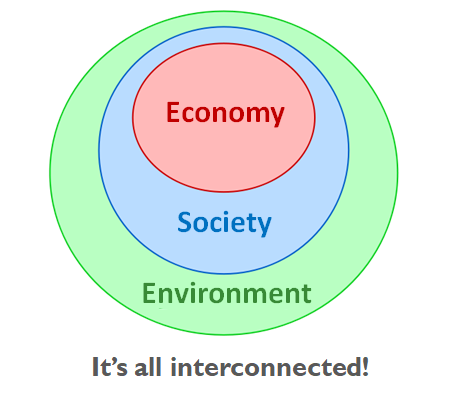Statement forthcoming
Sustainability Education & the SUS Attribute

WHY Teach Sustainability?
In an effort to make both the present and the future just, vibrant, safe, and sustainable, we need to foster a culture of sustainability on our campus and, by extension, in our wider communities, so that it becomes a lens of habit in the way we live our lives. A “culture of sustainability” implies a recognition of the interconnections and interdependencies of human and natural systems. Our health, economy, and society need healthy ecosystems in order to thrive.
It is vital that sustainability education be included in courses found across the curriculum so our students are aware that the decisions we make in our daily lives at school, work, home, and at play all have impacts on our household, local, regional, and global contexts (environmental, social, and economic). And, similarly, that we are all affected by our climate, the quality of our air, food, and water, as well as the infrastructure and amenities available to us (e.g., mass transit, housing), and the policies that govern and regulate our society.
Teaching sustainability in an array of courses will increase students’ awareness and comprehension that healthy human societies are fostered and supported through a complex web of interconnections between their physical, social, and economic dimensions. Sustainability-inclusive courses will enable students to recognize their own position of power and equip them with the necessary skills and understanding to address the sustainability challenges we face both at home and in the global arena.
Teaching sustainability and using the SUS attribute will provide additional benefits for students, faculty, the institution, and our wider community.
WSU Interim President Leslie Durham

WHAT is the SUS Attribute? (sustainability defined)
The SUS attribution on courses stands for “sustainability” and formally indicates that a course involves some sustainability components and learning outcomes (as outlined below), which aim to both further students’ understanding of and ability to address real world sustainability challenges. Defined in a pluralistic way, sustainability recognizes the interdependence of ecological and social/economic systems. It encompasses human and ecological health, social justice, secure livelihoods, and a better world for all generations. Often depicted as a three-legged stool, this multidimensional concept includes social, economic, and environmental components with each representing one of the stool’s legs. Major sustainability challenges include (but are not limited to) climate change, global poverty and inequality, natural resource depletion, and environmental degradation. To identify additional sustainability challenges, it may be helpful to reference the UN Sustainable Development Goals (SDGs).
The SUS attribute was approved by the WSU Faculty Senate January 17, 2019.
HOW to Apply
The Application Process - two easy steps
To apply for a SUS Attribute for your class or all sections of a course (all sections requires departmental approval) you will need to:
- Review the criteria and prepare your syllabus.
- Complete the High Impact Educational Experiences (HIEE) Attribute Request Form (housed in GivePulse)
- You will need to upload your syllabus.
- FYI - You are able start this form and return to it before completing the submission.
The application will require an explicit explanation (or course description) of how sustainability is tied to the existing course (whether as the focus of the course or a component(s) of the course), the sustainability-related learning outcomes, and a description of how you plan to assess those learning outcomes. Please note that new courses need to go through the regular College and University Curriculum process for approval as courses, prior to or while simultaneously seeking the SUS attribution.
Faculty may apply for the SUS attribute for just their section(s) of a course, or for the whole course, regardless of instructor. The latter requires you confirm that you have permission at the departmental level for a course to carry the SUS attribute (email, letter, etc.). This confirmation is attached in the application form. If approved at the course level, it is the responsibility of the department to ensure that all sections of a course include the necessary sustainability components as indicated in the original application.
Application Due Dates:
- October 1, 2025 for SUS to be included on upcoming spring courses
- March 1, 2026 for upcoming summer and fall courses
- (applications may be submitted at other times, but these are the deadlines for review prior to the upcoming semester)
Have questions or need help preparing for the deadline? Drop into a Zoom help session, or email heatherroot@weber.edu or amulder@weber.edu with questions.
Spring Semester 2026 Help sessions:
Attribute Term
Once a course is approved for the SUS attribution, the attribution will be valid for 5 years, at which point the faculty member will be prompted to apply for renewal, if desired. The first renewals were delayed by are expected to start in Fall 2026, for those classes first approved for AY2020/21.
Sustainability Across the Curriculum Community of Practice
If you are interested in joining with other faculty from across campus to explore including sustainability in a class or classes you teach, consider joining the Sustainability Community of Practice.
Questions
If you have any questions, please contact the SUS Attribute Committee Chair, Alice Mulder, amulder@weber.edu, or Heather Root, heatherroot@weber.edu
the SPARC Faculty in Residence.
Criteria and Application Process
Application Review Process
The SUS Attribute Committee will review completed applications using the SUS Attribute Rubric.
